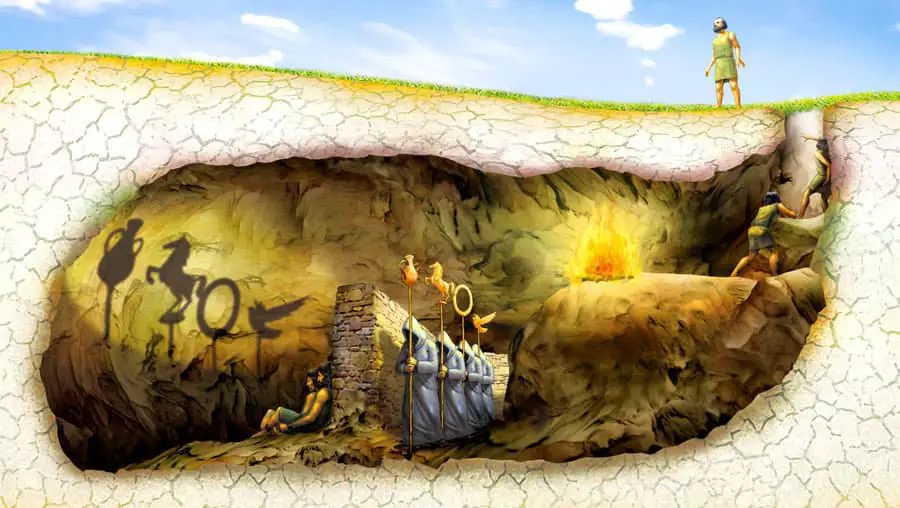“The Art of Not Knowing” challenges us to confront an essential paradox: how can we know what we don’t know if we don’t know what we don’t know?
This inquiry may seem like a riddle, but it delves deep into the intricate interplay of knowledge, belief, and the limits of human understanding. In a world saturated with information, misinformation, personal convictions, and assumptions, the ability to discern the boundaries of our true knowledge becomes a critical skill.
At the heart of this exploration lies a profound self-awareness and an understanding of the human brain’s inherent biases.
This article delves into these realms, offering insights into recognizing and leveraging the limits of our knowledge. Through this journey, we aim to equip readers with the tools to navigate the complexities of information and belief, transforming the unknown into a landscape of learning and growth.
Understanding Our Own Knowledge:
The Boundaries of Human Consciousness

The Pitfalls of Assumption and Oversimplification” encourages us to delve into the often blurred line between what we genuinely know and what we presume to know. Our daily choices are significantly influenced by this distinction.
A common trap we fall into is making assumptions, which leads us to oversimplify complex realities, thus distorting our perception and decision-making processes….
For example, take the complexities surrounding mental health. Advising someone with depression to “just smile more” drastically simplifies a multifaceted issue that spans biological, psychological, and societal dimensions. This is similar to telling someone with a broken leg to “just walk it off” – it completely disregards the severity and intricacy of the condition.
This tendency to presume understanding and then simplify solutions or conclusions is especially prevalent in politics.
Opinions on socio-economic policies and geopolitical matters often overlook the intricate interplay of various influencing factors. It’s comparable to evaluating an iceberg solely by its visible tip while ignoring the immense structure that lies beneath.
The antidote to making assumptions and oversimplifications is the practice of critical thinking.
Engaging in a process of questioning, analyzing, and critically evaluating what we think we know allows us to filter through our subjective beliefs. This process allows us to reach a place of objective, evidence-based understanding.
To truly comprehend the limitations of our knowledge, we must constantly question our methods of understanding.
By adopting this investigative approach, we elevate our decision-making from mere reactive responses to informed, thoughtful actions, thereby greatly enriching our comprehension of both ourselves and the world around us.
Why Do We Believe In Things We Don’t Know !

1. We Make Assumptions
As humans we naturally make assumptions as a cognitive shortcut to process the vast amount of information we encounter daily. This process, known as heuristics, allows us to make quick decisions without analyzing every detail.
Experts in cognitive psychology, such as Daniel Kahneman, a Nobel laureate and author of “Thinking, Fast and Slow,” illustrate that humans often rely on heuristics – mental shortcuts that enable quick, efficient judgments.
This reliance is due to the brain’s tendency to conserve cognitive resources, making assumptions to fill gaps in information based on past experiences and perceived patterns. These shortcuts, while efficient, can lead to biases and inaccuracies.
2. We Oversimplify
Oversimplification by humans is a cognitive phenomenon deeply rooted in the workings of our brain.
According to experts like Nobel laureate Daniel Kahneman, author of “Thinking, Fast and Slow,” our brain operates using two systems: one fast, intuitive, and emotional, and the other slower, more deliberative, and logical.
The fast system often leads to simplifying complex information to make quick decisions, a process known as heuristics. These mental shortcuts are efficient but can sometimes lead to cognitive biases.
Kahneman’s research demonstrates how these systems work together and how they sometimes lead to oversimplification, providing insights into our cognitive processes and decision-making.
This understanding is crucial in fields ranging from psychology to behavioral economics, shedding light on the human propensity to simplify complex situations.
3. We Get Bad Information
Where Are We Learning Our “”Knowledge“” From ?

One of the most critical parts on understanding what’s true and what’s not is determining the source of information.
How To Tell If Your Information Source is Reliable…
Here’s some examples of what to look out for…
| Tip # | Breakdown |
|---|---|
| 1. Evidence-Based Information | Search for hard evidence like data, statistics, or research findings that back up the claims. Be wary of sources presenting opinions as facts without supporting evidence. |
| 2. Source Reputation | Investigate the source’s credibility. Traditional news outlets, government websites, and academic institutions typically provide reliable information. However, be cautious with TV and social media, where sensationalized or unverified information may circulate. |
| 3. Peer Review | In academic and scientific fields, peer-reviewed articles are validated for accuracy by experts in the same field. This process is less common in TV and social media, but there can be exceptions, particularly on platforms dedicated to academic discussions. |
| 4. Relevance and Context | Check whether the information is directly related to the topic in question and if it’s presented in the correct context. Be skeptical of sources that misuse or misinterpret data to fit a specific narrative. |
| 5. Publication Date | Especially in quickly changing fields like science or tech, newer information is usually more accurate. Older posts or articles might no longer be relevant or accurate. |
| 6. Bias Detection and Conflicts of Interest | Recognize that all sources have some level of bias. Reliable sources strive to present balanced information, showing different viewpoints. Be cautious of sources only showing one side of a story. Look out for potential conflicts of interest, such as financial ties that might influence the information presented. For instance, a positive review of a product may be less trustworthy if the reviewer received payment or the product for free from the manufacturer. |
| 7. Fact-Check | Verify the information with other trustworthy sources or use fact-checking websites, especially when dealing with potentially misleading platforms like social media. |
| 8. Trust but Verify | Even if a source has been reliable in the past, always approach new information with a critical eye. Remember, even reputable sources can sometimes publish incorrect information. |
4. Our Human Ego Gets in The way
How our Ego Effects What We Think We Know

Ego in Different Psychological Theories:
Freudian Theory: Sigmund Freud described the ego as a mediator between our primal desires (id) and moral standards (superego). The ego shapes our reality by filtering experiences and memories, often leading to a skewed perception of ourselves and our abilities.
Humanistic Perspective: Theorists like Carl Rogers in humanistic psychology argue that our self-concept plays a critical role in personal growth. If this self-concept is distorted, it can prevent us from accurately understanding our true abilities and knowledge.
Cognitive Biases Influenced by the Ego:
Dunning-Kruger Effect: This effect shows that people with limited knowledge in a particular area often overestimate their understanding or ability, a direct result of the ego’s impact on self-assessment.
Confirmation Bias: Our ego often leads us to favor information that aligns with our existing beliefs, affecting how we interpret new information and assess our understanding.
Neuroscience Insights into the Ego:
Advances in neuroscience have identified areas in the brain, like the prefrontal cortex, that are involved in self-reflection and ego. These areas contribute to integrating personal experiences with our beliefs, influencing our perceived knowledge.
Emotional Intelligence (EQ) and Its Relation to the Ego:
EQ involves understanding and managing our own emotions and those of others. A high EQ can help reduce the ego’s negative impact on our decisions, leading to a more realistic evaluation of our abilities and knowledge.
Social and Cultural Factors:
Our ego and self-concept are also shaped by the society and culture we live in, which influences what we consider important to know and understand. This societal influence can either support or challenge our ego-driven beliefs and perceived knowledge.
Mindfulness as a Tool to Understand the Ego:
Mindfulness practices encourage observing thoughts and feelings without judgment influenced by the ego. This can lead to a more accurate understanding of our knowledge and limitations.
Practical Applications:
Developing Self-Awareness: Regular reflection can help identify biases caused by the ego.
Valuing Feedback: Seeking and considering feedback from various sources can offer a reality check for our ego-influenced self-perceptions.
Embracing Continuous Learning: Adopting a mindset geared towards growth can counter the ego’s tendency to overestimate one’s knowledge.
Balancing Confidence with Humility: Recognizing one’s strengths while being open to new learning helps maintain a healthy ego.
5. Our Emotional State (Fear and Happiness)
The psychology behind why people believe in things they don’t fully know is complex and multifaceted.
According to a study in Nature Reviews Psychology, our emotional state significantly influences our belief formation.
For example, misleading information that evokes strong emotions, particularly fear or happiness, tends to be more persuasive. This is because emotional responses can overshadow more analytical considerations like the credibility of the source.

Additionally, our current emotional state can sway how we evaluate information, with certain moods like happiness or anger making us more susceptible to deception and misinformation.
For a concise takeaway, it’s important to understand that our beliefs are often shaped more by emotional responses and current mood than by logical evaluation of facts.
Awareness of this tendency can help in critically assessing information and forming more informed beliefs.
5 Action Steps For Embracing the Limits of Our Knowledge

| Action Steps | What It’s About | Positive Impacts |
| 1. Coping with Uncertainty | Understanding that we don’t know everything helps us navigate the great unknown. | Ignites our curiosity and promotes a mindset that’s all about exploration and discovery, which is super handy in our speedy, always-on-the-move world. |
| 2. Staying Open to New Information | Recognizing that our understanding has its limits keeps us open to fresh perspectives. | Makes us more adaptable and able to tweak our viewpoints based on new evidence, leading to smarter decision-making. |
| 3. Avoiding Overconfidence | Being aware of our knowledge boundaries can help keep our confidence from turning into cockiness, which can stop learning in its tracks. | Straddles the line between confidence and healthy skepticism, paving the way for a better approach to understanding the world around us. |
| 4. Preventing the Spread of False Information | Knowing what we don’t know can keep us from spreading unverified info. | Puts the brakes on the spread of misinformation, which is a major issue in our digital era. |
| 5. Fostering Constructive Dialogue | Admitting the limits of our knowledge paves the way for respectful conversations. | Enables collaborative learning and creates a culture where diverse viewpoints are given the thumbs-up. |
In a nutshell, embracing our knowledge limits is not a setback, but a leap forward.
It steers us towards continuous learning, enables informed decision-making, and cultivates an atmosphere of curiosity and respect.
For the modern learner, knowing what you don’t know is a vital step towards wisdom.
Final Thoughts:
In summary, “The Art of Not Knowing”, or knowing what you dont know, emphasizes the value of recognizing the limits of our individual knowledge.
Knowing what you don’t know allows us to embrace uncertainty, staying open to new information, and avoiding overconfidence in misinformation.
This mindset fosters a culture of continuous learning, informed decision-making, and respectful dialogue. By understanding what cognitive biases and what emotional influences are effecting our beliefs, we can better navigate the complexities of information, thus transforming the unknown into opportunities for growth and wisdom.
This approach is crucial for informed and thoughtful decision-making in today’s information-rich world.
Loved what you read?
Hit that share button and let the world in on the secret – we’d be thrilled!
Got thoughts? We’re all ears for your feedback, corrections, or a good old chat. Don’t be shy; drop us a line.
And hey, don’t miss out on our curated list of must-reads in the recommended books section.
Big thanks for diving in with us today!



